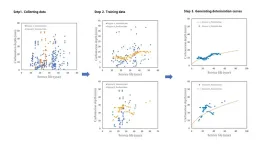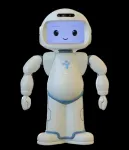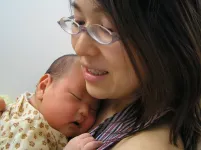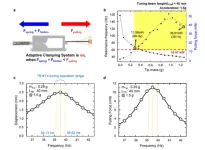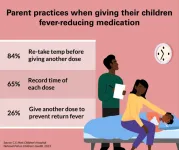(Press-News.org) For parents, the decision to vaccinate their kids against SARS-CoV-2 is complex, influenced by scientific evidence, political and social pressures, and views about individual versus collective benefits of vaccination, according to a new study published in CMAJ (Canadian Medical Association Journal) https://www.cmaj.ca/lookup/doi/10.1503/cmaj.221401.
Researchers conducted a qualitative study with in-depth interviews of 20 parents to understand their views about SARS-CoV-2 vaccination, with a goal to support future vaccination initiatives.
“Given the observed discrepancy between parental intention and decision to vaccinate their children against SARS-CoV-2, it is important to understand how and why parents make their decisions,” said Dr. Jonathon Maguire, a pediatrician at St. Michael’s Hospital, a site of Unity Health Toronto, and the University of Toronto. “Understanding the factors that influence parents’ decisions about SARS-CoV-2 vaccination for their children would help improve public health policies and interventions as well as inform health care professionals about parents’ perspectives and concerns.”
Few previous studies have explored how parents make decisions to vaccinate, or not vaccinate, their children once eligible for vaccination.
The decision was challenging for most parents in the study. Parents’ considerations related to the following:
The newness of SARS-CoV-2 vaccines and evidence supporting their use
Perceived politicization of guidance for vaccination
Social pressures around SARS-CoV-2 vaccination
Weighing of individual versus collective benefits of vaccination
These findings have implications for communicating information on SARS-CoV-2 vaccination.
“Future guidance should highlight both individual and collective benefits of SARS-CoV-2 vaccination for children; however, health care providers should prioritize individualized discussions with parents to help interpret evidence, consider their understanding of risks and benefits, and provide tailored recommendations,” said Dr. Janet Parsons, a research scientist at St. Michael’s Hospital, a site of Unity Health Toronto, and an associate professor at the University of Toronto.
Health care providers have a key role to play in supporting parents in decision making.
“It is important for health care providers to understand that parents who seem hesitant to vaccinate their children may have a variety of reasons for feeling this way and may be reticent to ask questions to health care providers for fear of stigma,” said Dr Parsons. The authors recommend that these conversations be approached with empathy and openness.
END
How do parents decide if they should vaccinate their kids against SARS-CoV-2?
New study explores complexity of decision making
2023-02-21
ELSE PRESS RELEASES FROM THIS DATE:
Advocacy by LGBTQ+ school clubs may help combat student depression
2023-02-21
Advocacy by student-led Gender-Sexuality Alliance (GSA) clubs could help to reduce school-wide disparities in depressive symptoms between LGBTQ+ and heterosexual students, according to a new study.
The findings, published today in the Journal of Clinical Child and Adolescent Psychology, suggest that schools with GSAs (also known as Gay-Straight Alliances) that engage in more advocacy to highlight issues affecting LGBTQ+ students can help to promote well-being among LGBTQ+ youth across the wider school population.
“Discrimination ...
Does living along the US-Mexico border affect the chances of survival among children with leukemia?
2023-02-21
Residing in border regions was linked with a higher risk of dying within five years among children with acute lymphoblastic leukemia, the most common type of pediatric cancer.
In an analysis of cancer registry data from Texas, children with acute lymphoblastic leukemia (ALL) who lived along the border with Mexico were more likely to die within five years than those living in other areas of the state. The findings are published by Wiley online in CANCER, a peer-reviewed journal of the American Cancer Society.
The ...
New way to predict the damage and aging of bridges by using DNA. technologies
2023-02-21
The Korea Institute of Civil Engineering and Building Technology (KICT, President Kim Byung-Suk) announced that it has developed the D.N.A. (Data, Network, and AI) technologies to predict the levels of damage and aging of bridges for preventive maintenance.
As of 2021, the percentage of Korean bridges aged 30 years or more stands at a relatively low 12.5%. However, this ratio is expected to increase in the next decade to 39.3% by 2031 and rapidly spike up to 76.1% in 20 years. For the preemptive management of these aging bridges, the ...
Gameto licenses Wyss Institute tech to grow human ovaries in the lab
2023-02-21
Despite the fact that we all start out as an egg cell in one of our mother’s ovaries, these human reproductive organs are surprisingly under-studied. Scientists have been working on creating in vitro models of human ovaries so that we can learn more about them and develop treatments for ovarian conditions, but most existing models use a combination of human and mouse cells, which do not faithfully replicate human ovary functions and take a long time to grow in the lab.
Now, researchers at the Wyss Institute for Biologically Inspired Engineering at Harvard University, Harvard Medical School (HMS) and Duke University in collaboration with ...
Robot helps students with learning disabilities stay focused
2023-02-21
Engineering researchers at the University of Waterloo are successfully using a robot to help keep children with learning disabilities focused on their work.
This was one of the key results in a new study that also found both the youngsters and their instructors valued the positive classroom contributions made by the robot.
“There is definitely a great potential for using robots in the public education system,” said Dr. Kerstin Dautenhahn, a professor of electrical and computer engineering. “Overall, the findings imply ...
Most babies born to mothers with COVID-19 separated after birth resulting in low breastfeeding rates
2023-02-21
Most babies born to mothers with COVID-19 were separated after birth resulting in low breastfeeding and skin-to-skin contact rates during the height of the pandemic, according to a new global study.
The international research, led by Murdoch Children’s Research Institute in collaboration with the the European Society of Paediatric and Neonatal Intensive Care (ESPNIC), found that transmission of COVID-19 from mother to baby was rare and generally mild when it occurred. But despite this, almost half of all babies did not receive any breast milk, with ...
Cohesion and connection drop in ageing population
2023-02-20
Social cohesion and connection decline in an ageing population, according to a new study of one of humanity’s closest relatives.
For decades, researchers have been observing the rhesus macaques on Cayo Santiago (known as “Monkey Island”) in Puerto Rico.
Recent research showed that female macaques “actively reduce” the size of their social networks and prioritise existing connections as they age – something also seen in humans.
The new study, by an international team led by the University of Exeter, examines how this affects the overall cohesion and connection of the groups older monkeys live in.
While ...
Development of a self-resonant smart energy harvester
2023-02-20
The Internet of Things (IoT) requires the installation free of time and space, therefore, needs independent power sources that are not restricted by batteries or power lines. Energy harvesting technology harvests wasted energy such as vibration, heat, light, and electromagnetic waves from everyday settings, such as automobiles, buildings, and home appliances, and converts it into electrical energy. Energy harvesters can generate sufficient electricity to run small electronic devices by harvesting ambient energy sources without an external power supply.
The Korea Institute of Science and Technology (KIST, President Seok Jin Yoon) announced ...
1 in 3 parents may unnecessarily give children fever-reducing medicine
2023-02-20
For many children, winter season comes with regular exposure to circulating viruses at school or daycare. And a warm forehead is often one of the first clear signs a child has caught a bug.
But some parents may not be properly measuring or responding to elevated temperatures in children, a new national poll suggests.
While most parents recognize that a low-grade fever helps a child’s body fight off infection, one in three would give fever-reducing medication for spiked temperatures below 100.4 – which isn’t recommended – according to the C.S. Mott Children’s Hospital National Poll on Children’s Health at University of Michigan Health.
Half of parents ...
Correspondence shows troubling interactions between US officials and the alcohol industry
2023-02-20
Correspondence shows troubling interactions between U.S. officials and the alcohol industry
By Kimberly Flynn
PISCATAWAY, NJ — Growing evidence exists that the alcohol industry uses a variety of strategies to influence public policy in a way that is advantageous to its own corporate interests, rather than the interest of public health. Recent communication between employees of the National Institute on Alcohol Abuse and Alcoholism (NIAAA) and alcohol industry groups shows extensive interaction on policy-relevant scientific issues, according to a new study in the Journal of Studies on Alcohol and Drugs.
Researchers at the University ...
LAST 30 PRESS RELEASES:
SfN announces Early Career Policy Ambassadors Class of 2026
Spiritual practices strongly associated with reduced risk for hazardous alcohol and drug use
Novel vaccine protects against C. diff disease and recurrence
An “electrical” circadian clock balances growth between shoots and roots
Largest study of rare skin cancer in Mexican patients shows its more complex than previously thought
Colonists dredged away Sydney’s natural oyster reefs. Now science knows how best to restore them.
Joint and independent associations of gestational diabetes and depression with childhood obesity
Spirituality and harmful or hazardous alcohol and other drug use
New plastic material could solve energy storage challenge, researchers report
Mapping protein production in brain cells yields new insights for brain disease
Exposing a hidden anchor for HIV replication
Can Europe be climate-neutral by 2050? New monitor tracks the pace of the energy transition
Major heart attack study reveals ‘survival paradox’: Frail men at higher risk of death than women despite better treatment
Medicare patients get different stroke care depending on plan, analysis reveals
Polyploidy-induced senescence may drive aging, tissue repair, and cancer risk
Study shows that treating patients with lifestyle medicine may help reduce clinician burnout
Experimental and numerical framework for acoustic streaming prediction in mid-air phased arrays
Ancestral motif enables broad DNA binding by NIN, a master regulator of rhizobial symbiosis
Macrophage immune cells need constant reminders to retain memories of prior infections
Ultra-endurance running may accelerate aging and breakdown of red blood cells
Ancient mind-body practice proven to lower blood pressure in clinical trial
SwRI to create advanced Product Lifecycle Management system for the Air Force
Natural selection operates on multiple levels, comprehensive review of scientific studies shows
Developing a national research program on liquid metals for fusion
AI-powered ECG could help guide lifelong heart monitoring for patients with repaired tetralogy of fallot
Global shark bites return to average in 2025, with a smaller proportion in the United States
Millions are unaware of heart risks that don’t start in the heart
What freezing plants in blocks of ice can tell us about the future of Svalbard’s plant communities
A new vascularized tissueoid-on-a-chip model for liver regeneration and transplant rejection
Augmented reality menus may help restaurants attract more customers, improve brand perceptions
[Press-News.org] How do parents decide if they should vaccinate their kids against SARS-CoV-2?New study explores complexity of decision making
